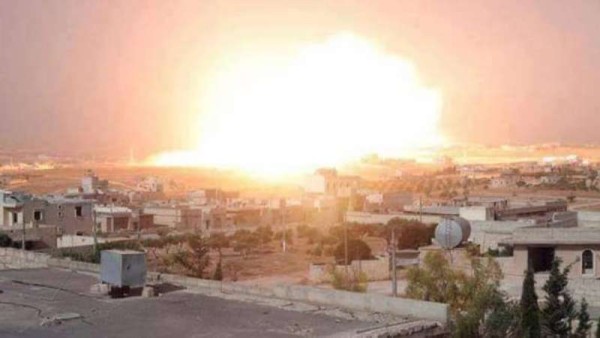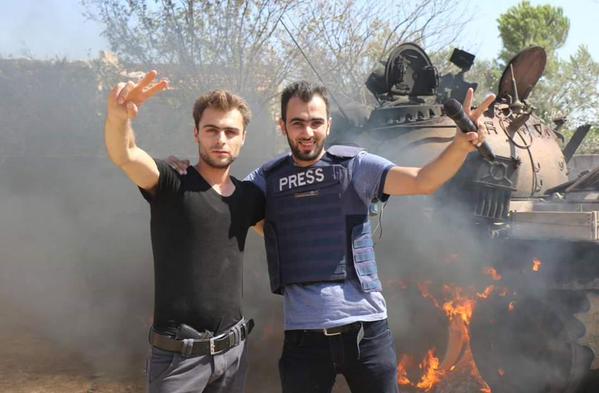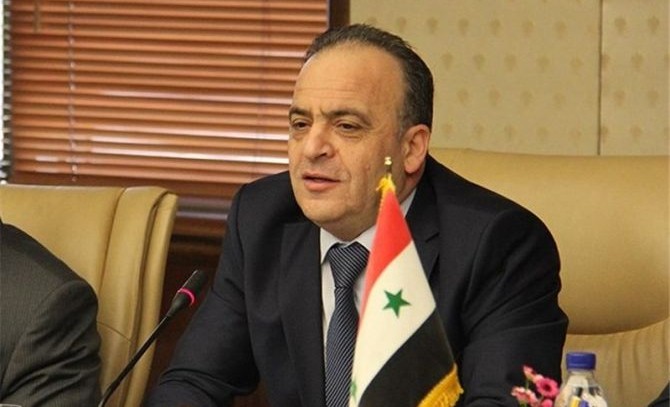PHOTO: Syria’s new Prime Minister Imad Khamis
LATEST
- 60,000 Stranded Without Food or Medical Care at Jordan Border
- Video: White Helmets Rescuers Pay Tribute to Jo Cox
- Video: Assad’s Russian Ally Admits ISIS Victory v. Syrian Military in Raqqa
- Video: Russian Incendiary Bombing of Aleppo Province
- Appeal for Medical Visa for Critically Injured Journalist al-Issa
THURSDAY FEATURE
Video: A Tribute to Jo Cox from Syrian Women
President Assad dismissed Syria’s Government on Wednesday, asking Electricity Minister Imad Khamis to form a new Cabinet.
The change of administration adheres to the 2012 Constitution, in which the Cabinet was considered to have a caretaker role upon the convening of a new Parliament on June 6.
However, it also has a political and economic dimension, as the Government of outgoing Prime Minister Wael al-Halqi was under pressure over rising prices and the crippled Syrian economy. A decision this month to raise the costs of gasoline and fuel has been criticized by pro-regime outlets.
On Wednesday, al-Halqi acknowledged the difficulty, explaining after a weekly Cabinet session:
The state treasury was greatly depleted by the war on Syria, and the years of war and the economic embargo have drained resources and caused production to stall in many sectors.
The government no longer produces oil but buys it in foreign currency, and raising petroleum products has become a necessity in order to keep providing them.
The regime has lost control of up to 95% of oilfields and a majority of gas fields, largely to the Islamic State, during Syria’s five-year conflict. With losses of almost $250 billion by the end of 2015, GDP has contracted about 15% each year.
The new Prime Minister Khamis has been Electricity Minister since 2011, having served as general manager of the state’s electricity distribution body. He was sanctioned by the European Union in March 2012 for “using power cuts as a method of repression”.
60,000 Stranded Without Food or Medical Care at Jordan Border
Aid agencies say up to 60,000 Syrian refugees are stranded at the Jordanian border without food, water, or medical care.
“They have nothing,” said Hala Shamlawi, a Red Cross spokesperson.
Some water was delivered on Thursday for the first time in four days:
The refugees have been trapped for months inside Syria after Jordan closed its border. They are in an informal settlement at Ruqban, held behind a raised berm, a sand barrier that marks the frontier.
Security measures were tightened on Wednesday after a suicide truck bomb attack killed six Jordanian soldiers. Jordan declared its northern and northeastern borders closed military zones.
Amnesty International said Jordan should not respond by “closing the border and denying humanitarian aid to tens of thousands of Syrian refugees fleeing armed conflict”.
However, the Jordanian Government’s spokesperson said Amman will not establish any new refugee camps, and will not expand existing ones.
Video: White Helmets Rescuers Pay Tribute to Jo Cox
Raed Saleh of Syria’s White Helmets civil defense organization pays tribute to Jo Cox, the British MP assassinated last week, “[She] was one of the friends who truly stood with us”:
Cox was prominent in her calls for the protection and support of Syrian civilians, including a civil defense service to deal with the frequent attacks by the Assad regime and its allies.
A Go Fund Me campaign has raised almost £1.4 million ($1.6 million) for three charities chosen by Cox’s family: the Royal Voluntary Service, HOPE Not Hate, and the White Helmets.
See Syria Video: A Tribute to Jo Cox from Syrian Women
Video: Assad’s Russian Ally Admits ISIS Victory v. Syrian Military in Raqqa
The Russian-based South Front has not only acknowledged but critiqued the Islamic State’s defeat of a Syrian military offensive in the ISIS center of Raqqa Province in northern Syria:
The Syrian military and Assad supporters had heralded a drive to take Taqba Airbase, captured by the Islamic State in 2014, and then Raqqa, the largest city held by ISIS in Syria. Pro-Assad forces reached a roundabout about 15 km (10 miles) south of Taqba almost two weeks ago.
However, the advance stalled and then the Islamic State counter-attacked, including with a series of vehicle bombs. ISIS retook much of the highway between the Sfaiyeh roundabout and Ithriya to the west. Some reports say the Syrian military was pushed completely out of Raqqa Province.
South Front blames the defeat on the difficulty in providing Russian close air support for the offensive. It does not indicate whether the fault lay with Moscow or with an ill-conceived advance by regime forces.
Video: Russian Incendiary Bombing of Aleppo Province
Footage of Russian incendiary bombs overnight on Aleppo Province in northwest Syria:
With the escalation of Russian and regime aerial attacks in the past two months, Moscow has increasingly turned to incendiary weapons — banned from use in civilian areas under international law — for its overnight strikes.
Claimed image of a Russian thermobaric bomb, which draws oxygen from surrounding air for an intense explosion, over Aleppo:

Aftermath of bombing on Khan al-Assal in western Aleppo Province:
Appeal for Medical Visa for Critically Injured Journalist al-Issa
Activists are appealing for a visa for medical treatment for critically-injured cameraman Khalid al-Issa.
Supporters are hoping that Issa, wounded with journalist Hadi al-Abdallah in Aleppo by an improvised explosive device, can be moved from Turkey to Germany for the necessary care.
Prominent activist Raed Fares
Issa has shrapnel injury to his brain and abdomen. Abdollah is stable with injuries to his eye, jaw, and left leg.
Issa and Abdallah have been on rebel frontlines and in opposition areas for years, filing reports such as the rebel victory in Idlib Province last year, the fight in and near Aleppo city, and the aftermath of bombings across northwest Syria.
Issa and Abdallah in Mansoura in northern Hama Province, August 2015:


